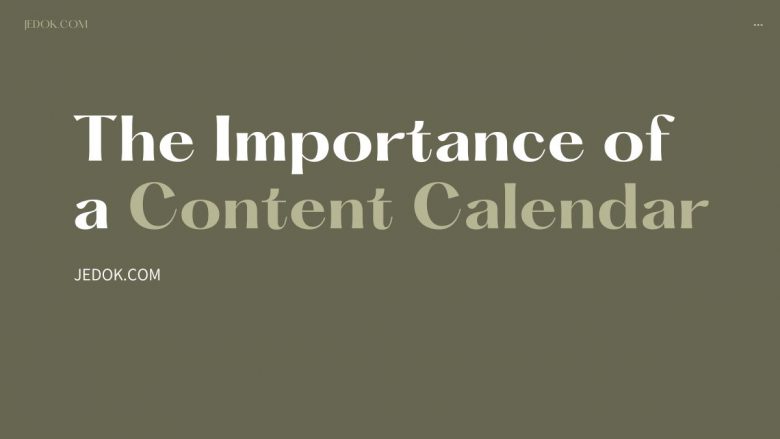
In the dynamic world of content marketing, staying organized and maintaining consistency are key to success. This is where a content calendar becomes an invaluable tool. A content calendar serves as a roadmap for your content strategy, helping you plan, organize, and execute your content initiatives efficiently. In this blog post, we will explore the importance of a content calendar and how it can streamline your content strategy for optimal results.
1. Structure and Organization:
A content calendar is a valuable tool for any successful content marketing strategy. It provides structure and organization, allowing you to plan and visualize your content marketing efforts. A well-structured content calendar helps you stay on track with your goals, ensuring that you are consistently producing high-quality, relevant, and engaging content.
With a structured content calendar in place, you can easily see what needs to be created or published each week or month. This will help ensure that your team stays on task and avoids last-minute scrambling to create new ideas or fill gaps in the schedule. Additionally, by planning out your content in advance, you can ensure that it aligns with key dates such as holidays or industry events.
Overall, implementing a structured and organized approach through a content calendar is essential for any business looking to succeed in today’s digital landscape.
2. Consistency and Timeliness:
Consistency is a crucial element in content marketing. Without consistency, it’s difficult to build brand recognition and establish trust with your audience. This is where a content calendar comes in handy. A content calendar helps you maintain a regular publishing schedule, ensuring that your audience always knows when to expect new content from you.
Creating a content calendar requires careful planning and organization. Start by identifying the types of content you want to publish and how often you want to publish them. This could include blog posts, social media updates, videos, podcasts, or webinars. Once you have this information, map out a publishing schedule for each type of content on your chosen platforms.
The benefits of using a content calendar go beyond just maintaining consistency; it also allows for better time management and more efficient use of resources.
3. Strategic Planning:
Content marketing is an essential aspect of digital marketing in today’s business world. It involves creating and sharing valuable content that attracts and retains a clearly defined audience. However, creating content on an ad-hoc basis without a plan can be counterproductive and inefficient. This is where strategic planning comes into play, and the use of a content calendar can make all the difference.
A content calendar is essentially a schedule that outlines what type of content will be created, when it will be published, and who will be responsible for its creation. With this tool in place, businesses can develop their content marketing strategy with ease. The calendar enables them to align their content with their overall goals by identifying key themes or messages they want to communicate across different channels at different times.
By using a content calendar for strategic planning purposes, businesses have greater control over their messaging and how they deliver it.
4. Collaboration and Efficiency:
A content calendar is an essential tool in the world of marketing, especially when it comes to collaboration and efficiency. It allows teams to work together seamlessly, facilitating better coordination and communication. At its core, a content calendar is a visual representation of the content that needs to be produced over a given period. It provides everyone on the team with a clear overview of deadlines, responsibilities, and milestones.
One of the most significant benefits of using a content calendar is how it improves workflow efficiency. By having everything mapped out in advance, team members can easily plan their workloads and stay on track with their tasks. This helps avoid any last-minute rushes or delays due to poor planning or lack of communication between team members. A well-organized content calendar ensures that everyone knows what they need to do for each piece of content being produced, helping them focus on their tasks without wasting time coordinating with other team members.
5. Optimization and Flexibility:
In today’s fast-paced digital world, content is king. No matter what industry you’re in, having a strong online presence is critical to success. However, simply creating content isn’t enough; you need to be strategic about it. That’s where a content calendar comes in.
A content calendar allows you to plan out your content strategy months in advance, ensuring that your posts are timely and relevant. It also enables you to optimize your posting schedule based on key metrics such as engagement rates and click-through rates. By tracking these metrics over time, you can make data-driven decisions about when and where to post your content for maximum impact.
But perhaps the biggest advantage of a content calendar is its flexibility. Because it allows you to plan ahead, you can easily adjust your strategy if something unexpected happens or if trends change suddenly.
Conclusion:
A content calendar is a vital tool for streamlining your content strategy and achieving success in content marketing. Its benefits include providing structure and organization, maintaining consistency and timeliness, enabling strategic planning, fostering collaboration and efficiency, and facilitating optimization and flexibility. By implementing a content calendar, you can effectively plan, create, and distribute valuable content that resonates with your audience, strengthens your brand, and drives desired outcomes. So, embrace the power of a content calendar and take your content marketing to new heights.


